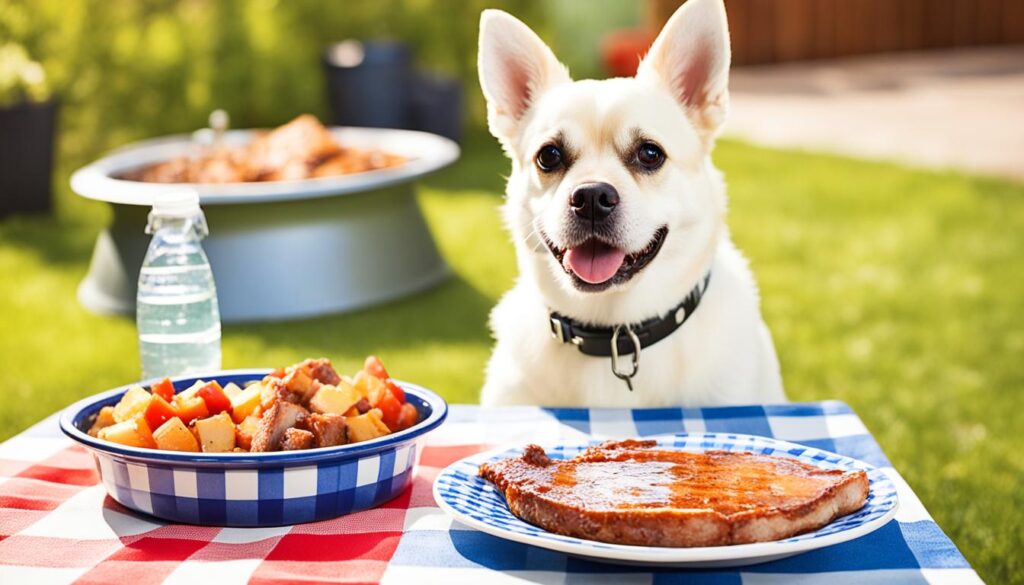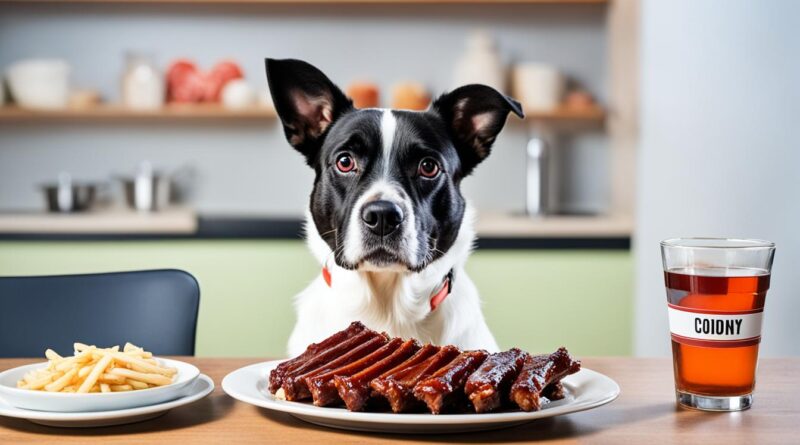Can Dogs Eat Pork Ribs? Safety & Risks Explained
When it comes to feeding our beloved canine companions, it’s important to be aware of the potential risks associated with certain foods. One common question that often arises is whether dogs can safely eat pork ribs. In this article, we will explore the safety considerations involved in feeding pork ribs to dogs and discuss the potential risks that come with it.
Pork ribs, both raw and cooked, can present dangers to dogs. The bones of pork ribs can splinter easily, leading to choking hazards and causing damage to the dog’s mouth, throat, or intestines. Ingesting the fatty tissue on these bones can also result in digestive issues such as vomiting, diarrhea, and even pancreatitis.
Given these risks, it is best to avoid feeding pork ribs to your furry friend altogether. Instead, focus on providing safe alternatives for them to chew on. Bully sticks, antlers, and tough rubber toys are excellent options that can satisfy your dog’s natural chewing instincts while minimizing the risk of injury.
Key Takeaways:
- Feeding pork ribs to dogs can be dangerous due to the risk of splintering bones and ingestion of fatty tissue.
- Pork rib bones can cause choking, mouth, throat, and intestinal injuries.
- Ingesting the fatty tissue on pork ribs can lead to digestive issues such as vomiting, diarrhea, and pancreatitis.
- Safe alternatives for dogs to chew on include bully sticks, antlers, and tough rubber toys.
- When cooking pork for dogs, avoid seasoning with harmful ingredients and serve it in moderation as part of a balanced diet.
Dangers of Giving Rib Bones to Dogs
Rib bones, whether cooked or raw, pose serious risks to dogs. They can splinter into shards, potentially causing choking and internal injuries. Dogs may also suffer from constipation, lacerations, and gastrointestinal upset if they chew and swallow bone fragments. In addition, the fatty tissue on the bones can lead to vomiting, diarrhea, and pancreatitis. It is crucial to prioritize the safety of dogs and avoid giving them pork rib bones.
“Giving dogs pork rib bones can result in a life-threatening situation. The shards can get stuck in their throat or cause damage to the intestines, which may require surgery to remove. It’s not worth the risk when there are safer alternatives available.”
Feeding dogs pork ribs is not worth the potential harm it can cause. The sharp bone fragments can get lodged in their mouth, throat, or digestive tract, leading to serious injuries and requiring expensive veterinary intervention. Even cooked pork ribs should be avoided, as the bones can still splinter and pose a significant threat. It is important to be aware of the potential dangers and prioritize the well-being of our furry companions by providing them with safe chew toys and treats.
The Risks of Choking and Internal Injuries
When dogs chew on rib bones, they run the risk of the bones splintering and causing choking hazards. The sharp fragments can become lodged in their throat, obstructing their airway and causing difficulty breathing. If swallowed, these bone shards can cause internal injuries, such as lacerations, punctures, and blockages in the digestive tract. These conditions can be life-threatening and require immediate veterinary attention.
Gastrointestinal Upset and Pancreatitis
The fatty tissue present on pork ribs can lead to digestive issues in dogs. Consuming excessive fat can result in vomiting, diarrhea, and gastrointestinal upset. In some cases, dogs may develop pancreatitis, which is inflammation of the pancreas. Pancreatitis can be a serious condition that requires veterinary treatment and can have long-term health implications for dogs.
It is imperative to understand the potential risks associated with feeding dogs pork rib bones. To ensure the safety and well-being of our canine companions, it is best to avoid giving them pork ribs altogether. Instead, provide them with appropriate and safe chew toys and treats that are specifically designed for dogs.
Safe Alternatives for Dogs
When it comes to satisfying your dog’s natural chewing instincts, it’s important to provide safe alternatives to pork ribs. Not only will this protect your furry friend from potential health risks, but it will also give them an enjoyable chewing experience. Here are some recommended options:
- Bully sticks: Made from dried beef or bull pizzle, bully sticks are a popular choice for dogs. They are long-lasting, digestible, and provide a satisfying chewing experience.
- Antlers: Natural antlers are another safe option for dogs to chew on. They are durable, rich in minerals, and help keep your dog’s teeth clean.
- Tough rubber toys: Sturdy rubber toys designed for aggressive chewers can provide hours of entertainment for your dog. Look for toys that are specifically labeled as “indestructible” or “heavy-duty” to ensure they can withstand your dog’s chewing habits.
It’s important to choose a size larger than what your dog can fit entirely into their mouth. This will prevent them from ripping the chew into smaller pieces that can be a choking hazard. Additionally, always supervise your dog while they are chewing to ensure they are safe and to intervene if necessary.
Why Choose Safe Alternatives?
“Providing safe alternatives to pork ribs is crucial for your dog’s well-being. These options not only satisfy their instinctual need to chew but also help promote dental health and prevent potential choking hazards.”
Incorporating safe alternatives into your dog’s routine will not only keep them entertained but also promote their dental health. Regular chewing helps clean your dog’s teeth and gums, reducing the risk of plaque buildup and gum disease. By providing these safe alternatives, you can ensure your dog remains happy, healthy, and out of harm’s way.
| Safe Alternatives | Benefits |
|---|---|
| Bully sticks | – Long-lasting and digestible – Satisfies chewing instincts |
| Antlers | – Durable – Cleans teeth naturally |
| Tough rubber toys | – Designed for aggressive chewers – Provides hours of entertainment |
By choosing safe alternatives for your dog, you can provide them with the enjoyment of chewing while ensuring their overall safety and well-being.

Can Dogs Eat Other Pork Products?
While it’s clear that pork ribs are not suitable for dogs, it’s important to approach other pork products with caution as well. Cooked pork bones, such as those found in pork chops and ribs, can still pose a risk of choking and internal injuries for dogs. Additionally, high-fat pork products like bacon and ham can lead to stomach upset, pancreatitis, and even obesity in dogs. Therefore, it is generally best to avoid feeding dogs pork unless it is thoroughly cooked and served in moderation.
| Pork Products | Risks for Dogs |
|---|---|
| Cooked Pork Bones (e.g., from pork chops and ribs) | Potential choking and internal injuries |
| High-Fat Pork Products (e.g., bacon and ham) | Stomach upset, pancreatitis, and obesity |
If you do decide to include pork in your dog’s diet, it’s crucial to ensure that it is cooked properly and served in moderation as part of a balanced diet. Lean cuts of pork can provide dogs with protein, but pork should not be the sole source of nutrition. A balanced and complete diet that meets AAFCO standards is recommended for dogs. If you choose to prepare homemade meals for your dog, consulting with a veterinary nutritionist can help you ensure that their diet is appropriately balanced.
Expert Quote:
“While pork ribs are not suitable for dogs, it’s best to approach all other pork products with caution as well. Cooked pork bones can still splinter and cause injuries, and high-fat pork products can lead to digestive issues and weight problems.”
Considerations for Cooking Pork for Dogs
If you’re considering cooking pork for your dog, it’s essential to take certain precautions to ensure their safety and well-being. While dogs can consume cooked pork in moderation, it’s important to know which types of pork products are safe and how to properly prepare them.
Pork itself is not toxic to dogs, but certain ingredients and cooking methods should be avoided to prevent any potential health risks. Here are some important considerations:
Avoid Harmful Ingredients
Onion and garlic: These common additions to pork dishes can be toxic to dogs and should be strictly avoided. Both onion and garlic contain compounds that can damage a dog’s red blood cells and lead to anemia.
Beware of Seasonings and Flavored Products
BBQ sauces and flavored products: These types of sauces and seasonings often contain high amounts of salt, sugar, and other additives that can be harmful to dogs. It’s best to stick to plain, unseasoned pork when cooking for your furry friend.
Choose Lean Cuts
When selecting pork cuts for your dog, opt for lean options like trimmed tenderloin or ultra-lean mince. These cuts have lower fat content, reducing the risk of digestive issues and weight gain for your pet.
Before cooking the pork, ensure it is thoroughly cooked to eliminate any possible bacteria or parasites that may be harmful to your dog’s health. Always remember to let the cooked pork cool down completely before feeding it to your dog.
Feeding pork to dogs should always be done in moderation. While it can be a tasty treat for your canine companion, excessive consumption can lead to obesity and other health problems. Treat pork as an occasional addition to your dog’s balanced diet.
Here’s a table summarizing the considerations for cooking pork for dogs:
| Consideration | Explanation |
|---|---|
| Avoid harmful ingredients | Onions and garlic can be toxic to dogs |
| Beware of seasonings and flavored products | BBQ sauces and flavored products often contain harmful additives |
| Choose lean cuts | Opt for trimmed tenderloin or ultra-lean mince |
| Moderation is key | Feed pork to dogs as an occasional treat |
Remember, when it comes to adding pork to your dog’s diet, always prioritize their safety and well-being. Consulting with your veterinarian can provide further guidance on incorporating pork into your dog’s balanced diet.

Pork as Part of a Balanced Diet
When it comes to incorporating pork into a dog’s diet, careful considerations must be made to ensure their health and well-being. While dogs can eat pork, it is essential to follow certain guidelines to keep them safe and promote a balanced diet.
Lean cuts of pork can provide dogs with a good source of protein. However, it’s important to note that pork should not be the sole source of nutrition for dogs. A well-rounded and complete diet, formulated to meet AAFCO standards, is crucial for their overall health and longevity.
If dog owners prefer to prepare homemade meals for their furry friends, it is highly recommended to consult with a veterinary nutritionist. These professionals can help ensure that the diet plan is appropriately balanced and meets all the necessary nutritional requirements for dogs.
While pork can be a part of a dog’s diet, it should be cooked properly and served in moderation. It is advised to avoid seasoning the pork with harmful ingredients like onion and garlic, as they can be toxic to dogs. Additionally, high-fat pork products such as bacon and ham should be limited or avoided altogether to prevent gastrointestinal upset, pancreatitis, and obesity.
By following these guidelines and consulting with a veterinary professional, dog owners can responsibly incorporate pork into their pet’s diet while prioritizing their health and well-being.
Conclusion
Feeding pork ribs to dogs poses significant risks and should be avoided. Both raw and cooked pork bones can splinter, leading to choking or injuries to a dog’s mouth, throat, or digestive tract. Consumption of the fatty tissue on the bones can result in vomiting, diarrhea, and pancreatitis. To ensure the safety of our beloved canine companions, it is crucial to provide them with safe alternatives for chewing, such as bully sticks, antlers, or durable rubber toys.
Moreover, it is important to acknowledge that pork ribs are not the only concern when it comes to pork and dogs. Pork chops and other cooked pork bones can still present similar risks. High-fat pork products, like bacon and ham, can also lead to digestive issues, pancreatitis, and obesity. Therefore, it is best to exercise caution when offering any pork product to dogs, ensuring it is thoroughly cooked and served in moderation.
When cooking pork for dogs, it is necessary to avoid using harmful ingredients, such as onion and garlic, which can be toxic to them. Seasoning the pork with BBQ sauces or other flavored products should also be avoided due to their high salt content. Lean cuts of pork, such as trimmed tenderloin or ultra-lean mince, should be prepared plain or with minimal safe seasoning. It is essential to remember that pork should not be the sole source of a dog’s nutrition; a balanced and complete diet designed to meet AAFCO standards is recommended. If choosing to prepare homemade meals, consulting with a veterinarian or veterinary nutritionist can ensure that the diet is appropriately balanced for the dog’s optimal health.
In conclusion, the answer to the question “Can dogs eat pork ribs?” is a resounding no. Feeding pork ribs to dogs can put their health at risk due to the potential for choking, internal injuries, and pancreatitis. It is safer and wiser to provide dogs with safe chew alternatives and to approach pork consumption with caution, ensuring careful preparation and moderation. By prioritizing our furry friends’ safety and consulting professionals, we can ensure their well-being and maintain a healthy and balanced diet for a long and happy life together.
FAQ
Can dogs eat pork ribs?
Feeding pork ribs to dogs can be dangerous and should be avoided. Both raw and cooked pork rib bones can splinter and cause choking or damage to the dog’s mouth, throat, or intestines.
Are pork ribs safe for dogs?
No, pork ribs are not safe for dogs to eat. Rib bones, whether cooked or raw, pose serious risks to dogs. They can splinter into shards, potentially causing choking and internal injuries.
Can dogs have pork ribs?
No, it is not recommended to give dogs pork ribs. Ingesting the fatty tissue on the bones can lead to vomiting, diarrhea, and pancreatitis.
Are pork ribs good for dogs?
No, pork ribs are not good for dogs. They can cause choking, internal injuries, and stomach issues in dogs.
Can dogs chew on pork ribs?
No, dogs should not chew on pork ribs. There are safe alternatives for dogs to chew on, such as bully sticks, antlers, or tough rubber toys.
Can dogs digest pork ribs?
It is not recommended for dogs to eat pork ribs as they can cause digestive issues. The bones can splinter and cause harm to the dog’s digestive tract.
Can dogs eat cooked pork ribs?
No, dogs cannot eat cooked pork ribs. Cooked pork bones, such as those in pork chops and ribs, can still pose a risk of choking and internal injuries.
Can dogs eat bacon?
Dogs should not eat bacon. High-fat pork products like bacon can lead to tummy upset, pancreatitis, and obesity in dogs.
Can dogs eat ham?
It is best to avoid feeding ham to dogs. High-fat pork products like ham can lead to digestive issues, pancreatitis, and obesity in dogs.
Can dogs eat pork?
Dogs can eat pork, but it should be cooked properly and served in moderation. Lean cuts of pork can provide protein, but it should not be the sole source of nutrition for dogs.
Is it okay for dogs to eat pork ribs?
No, it is not okay for dogs to eat pork ribs. Feeding pork ribs can pose serious health risks for dogs, including choking, internal injuries, and digestive issues.


